Sociology Assignment: Climate Change, Health Risks, and Policy Briefs
VerifiedAdded on 2023/01/18
|14
|2434
|83
Report
AI Summary
This sociology report examines the profound impact of climate change on global public health. It begins by documenting the scientific evidence of climate change, including fluctuations in global temperatures and extreme weather events, and highlights the role of greenhouse gas emissions in driving these changes. The report emphasizes the direct and indirect health consequences, such as increased disease transmission, heat stress, and disruptions to ecosystems. It critiques current climate change mitigation and adaptation measures, pointing out the need for evidence-based policies and greater involvement of epidemiologists in policy development. The report proposes a policy brief encouraging collaboration between policymakers and epidemiologists, advocating for increased funding for research and the development of effective strategies to protect communities from climate-related health risks. It also recommends national and global strategies, focusing on emission cuts, and improved understanding of health risks to combat the adverse effects of climate change.
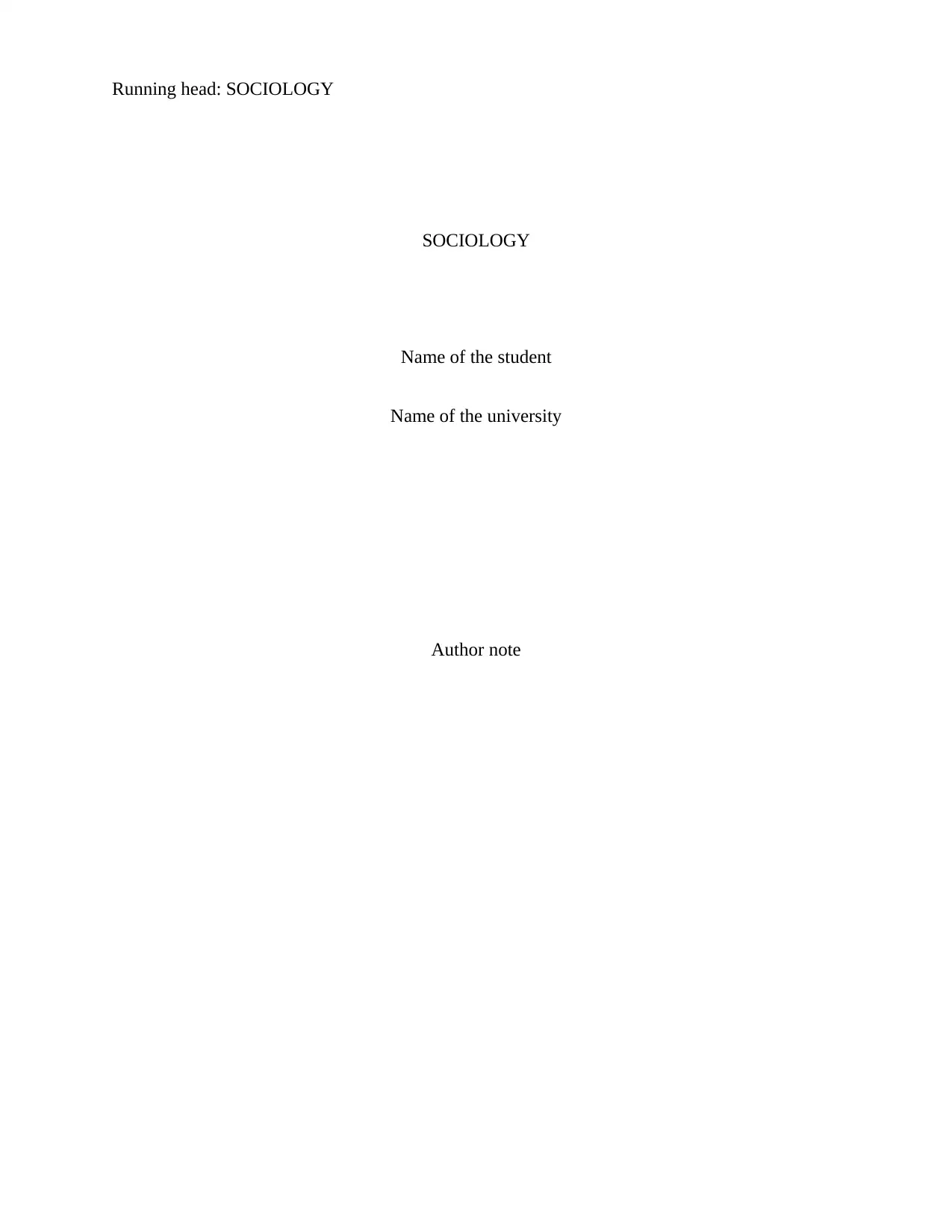
Running head: SOCIOLOGY
SOCIOLOGY
Name of the student
Name of the university
Author note
SOCIOLOGY
Name of the student
Name of the university
Author note
Paraphrase This Document
Need a fresh take? Get an instant paraphrase of this document with our AI Paraphraser
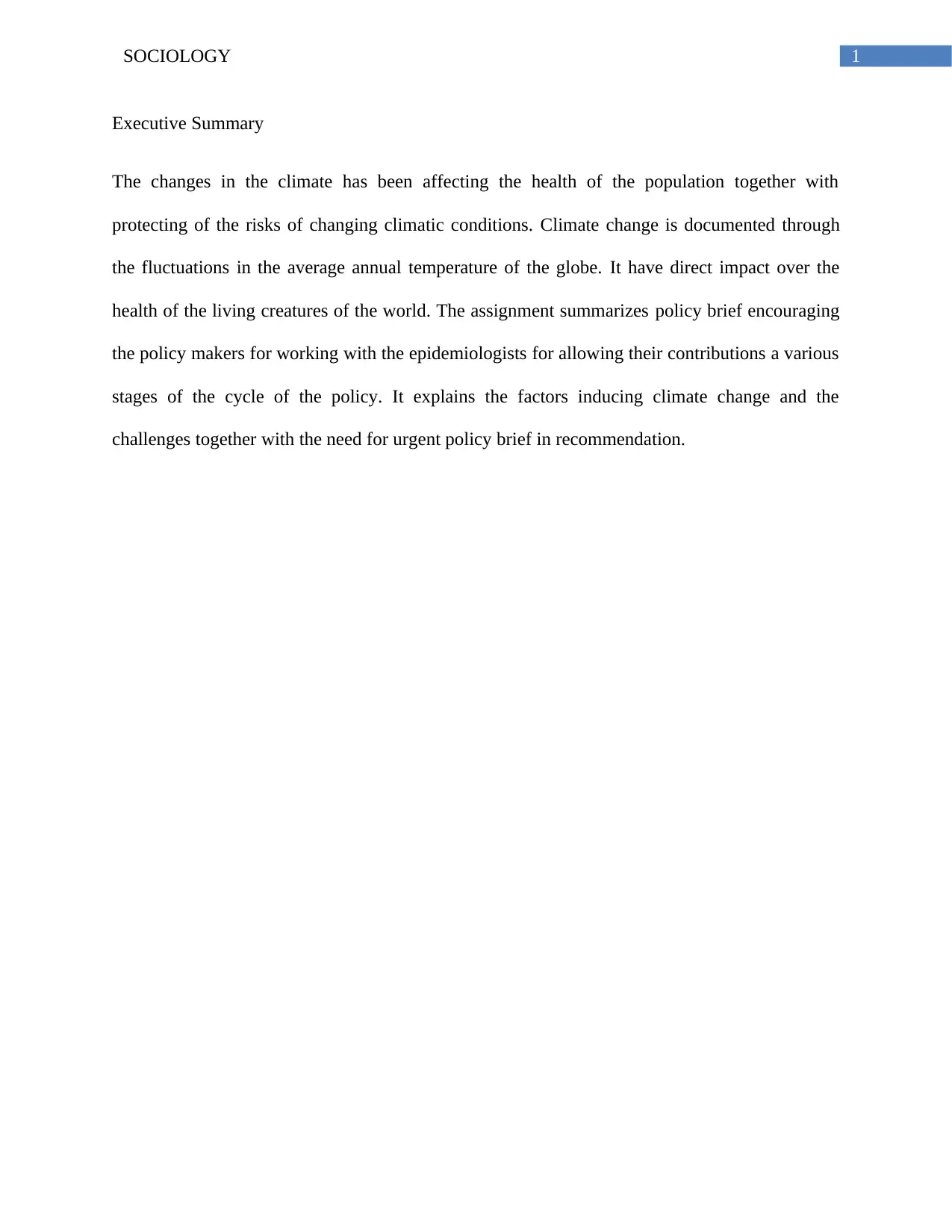
SOCIOLOGY 1
Executive Summary
The changes in the climate has been affecting the health of the population together with
protecting of the risks of changing climatic conditions. Climate change is documented through
the fluctuations in the average annual temperature of the globe. It have direct impact over the
health of the living creatures of the world. The assignment summarizes policy brief encouraging
the policy makers for working with the epidemiologists for allowing their contributions a various
stages of the cycle of the policy. It explains the factors inducing climate change and the
challenges together with the need for urgent policy brief in recommendation.
Executive Summary
The changes in the climate has been affecting the health of the population together with
protecting of the risks of changing climatic conditions. Climate change is documented through
the fluctuations in the average annual temperature of the globe. It have direct impact over the
health of the living creatures of the world. The assignment summarizes policy brief encouraging
the policy makers for working with the epidemiologists for allowing their contributions a various
stages of the cycle of the policy. It explains the factors inducing climate change and the
challenges together with the need for urgent policy brief in recommendation.
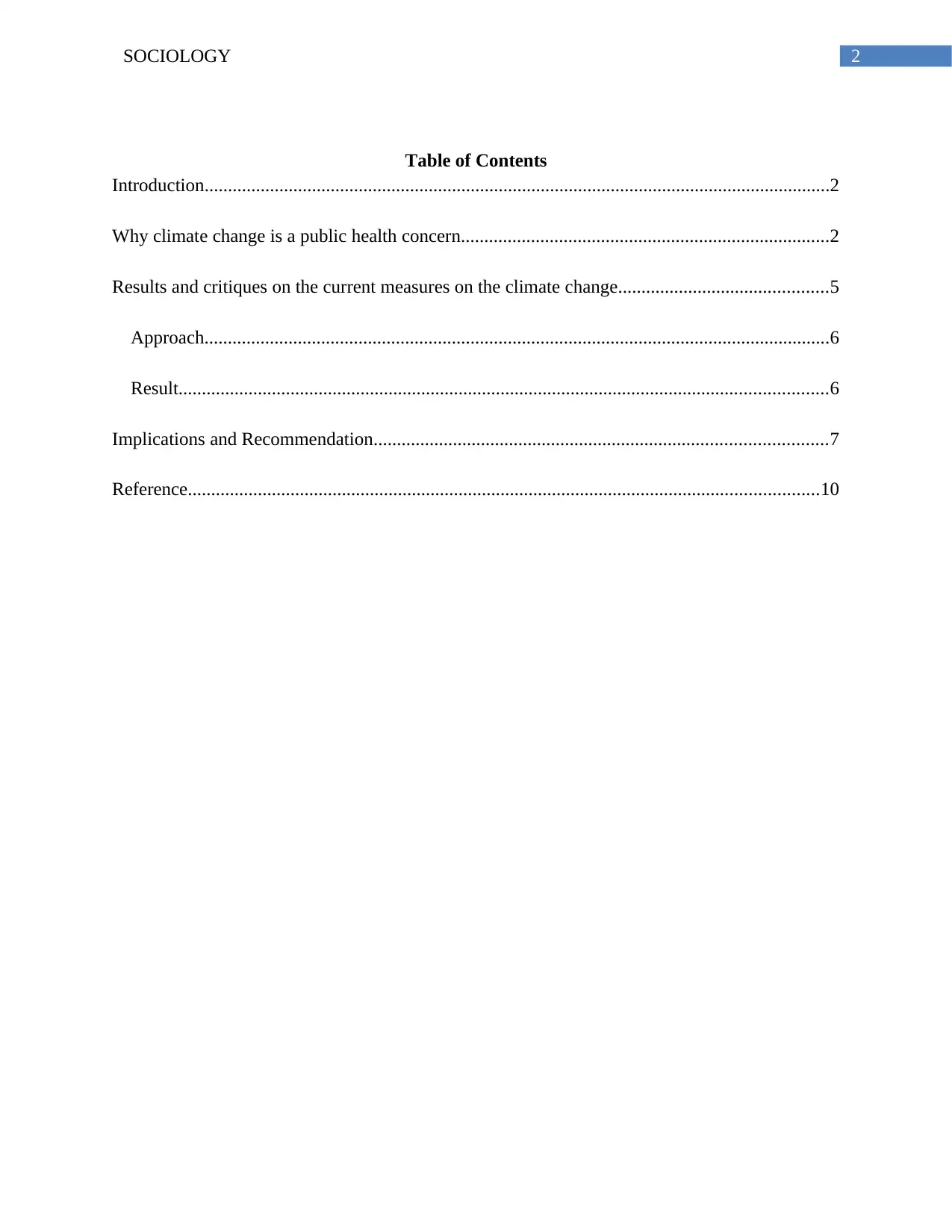
2SOCIOLOGY
Table of Contents
Introduction......................................................................................................................................2
Why climate change is a public health concern...............................................................................2
Results and critiques on the current measures on the climate change.............................................5
Approach......................................................................................................................................6
Result...........................................................................................................................................6
Implications and Recommendation.................................................................................................7
Reference.......................................................................................................................................10
Table of Contents
Introduction......................................................................................................................................2
Why climate change is a public health concern...............................................................................2
Results and critiques on the current measures on the climate change.............................................5
Approach......................................................................................................................................6
Result...........................................................................................................................................6
Implications and Recommendation.................................................................................................7
Reference.......................................................................................................................................10
⊘ This is a preview!⊘
Do you want full access?
Subscribe today to unlock all pages.

Trusted by 1+ million students worldwide
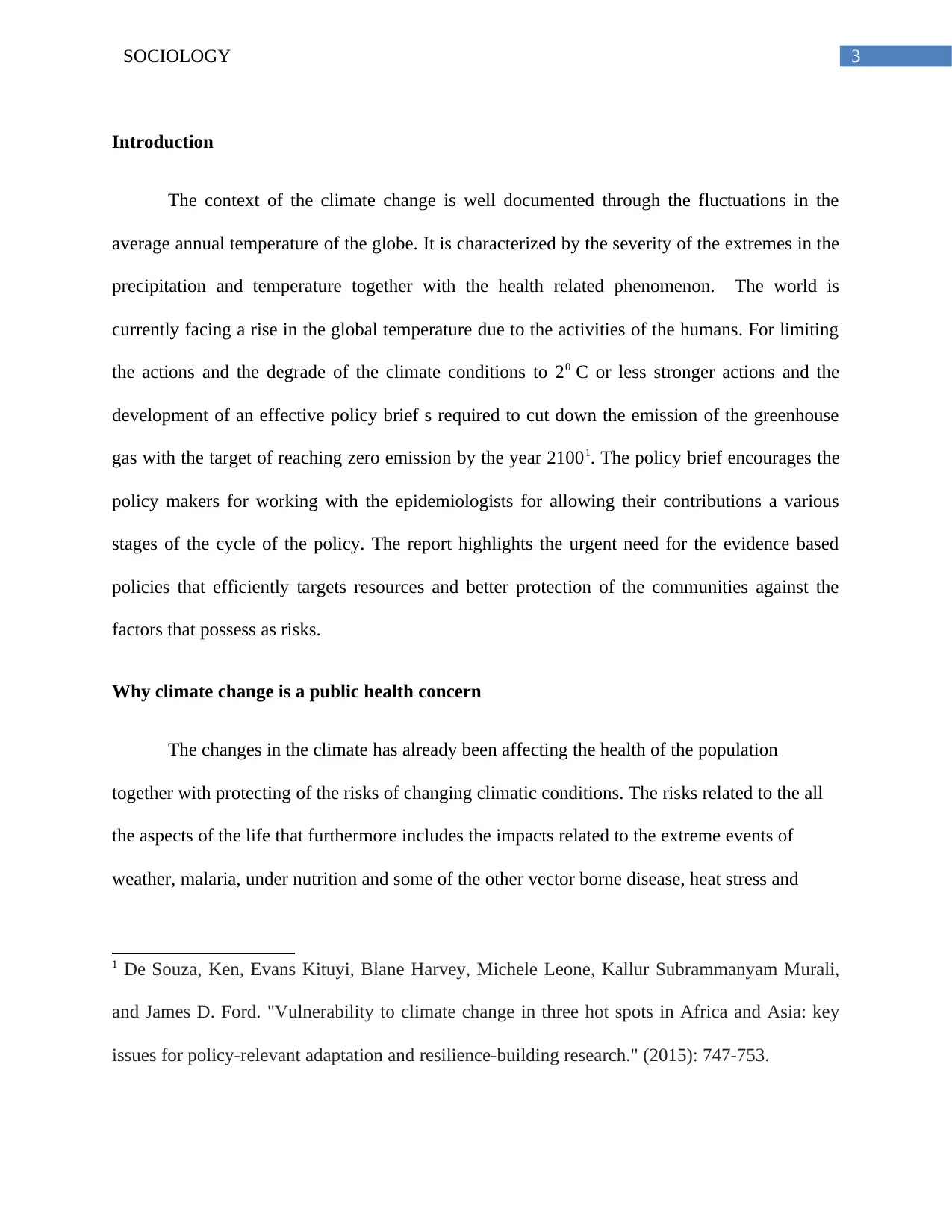
3SOCIOLOGY
Introduction
The context of the climate change is well documented through the fluctuations in the
average annual temperature of the globe. It is characterized by the severity of the extremes in the
precipitation and temperature together with the health related phenomenon. The world is
currently facing a rise in the global temperature due to the activities of the humans. For limiting
the actions and the degrade of the climate conditions to 20 C or less stronger actions and the
development of an effective policy brief s required to cut down the emission of the greenhouse
gas with the target of reaching zero emission by the year 21001. The policy brief encourages the
policy makers for working with the epidemiologists for allowing their contributions a various
stages of the cycle of the policy. The report highlights the urgent need for the evidence based
policies that efficiently targets resources and better protection of the communities against the
factors that possess as risks.
Why climate change is a public health concern
The changes in the climate has already been affecting the health of the population
together with protecting of the risks of changing climatic conditions. The risks related to the all
the aspects of the life that furthermore includes the impacts related to the extreme events of
weather, malaria, under nutrition and some of the other vector borne disease, heat stress and
1 De Souza, Ken, Evans Kituyi, Blane Harvey, Michele Leone, Kallur Subrammanyam Murali,
and James D. Ford. "Vulnerability to climate change in three hot spots in Africa and Asia: key
issues for policy-relevant adaptation and resilience-building research." (2015): 747-753.
Introduction
The context of the climate change is well documented through the fluctuations in the
average annual temperature of the globe. It is characterized by the severity of the extremes in the
precipitation and temperature together with the health related phenomenon. The world is
currently facing a rise in the global temperature due to the activities of the humans. For limiting
the actions and the degrade of the climate conditions to 20 C or less stronger actions and the
development of an effective policy brief s required to cut down the emission of the greenhouse
gas with the target of reaching zero emission by the year 21001. The policy brief encourages the
policy makers for working with the epidemiologists for allowing their contributions a various
stages of the cycle of the policy. The report highlights the urgent need for the evidence based
policies that efficiently targets resources and better protection of the communities against the
factors that possess as risks.
Why climate change is a public health concern
The changes in the climate has already been affecting the health of the population
together with protecting of the risks of changing climatic conditions. The risks related to the all
the aspects of the life that furthermore includes the impacts related to the extreme events of
weather, malaria, under nutrition and some of the other vector borne disease, heat stress and
1 De Souza, Ken, Evans Kituyi, Blane Harvey, Michele Leone, Kallur Subrammanyam Murali,
and James D. Ford. "Vulnerability to climate change in three hot spots in Africa and Asia: key
issues for policy-relevant adaptation and resilience-building research." (2015): 747-753.
Paraphrase This Document
Need a fresh take? Get an instant paraphrase of this document with our AI Paraphraser
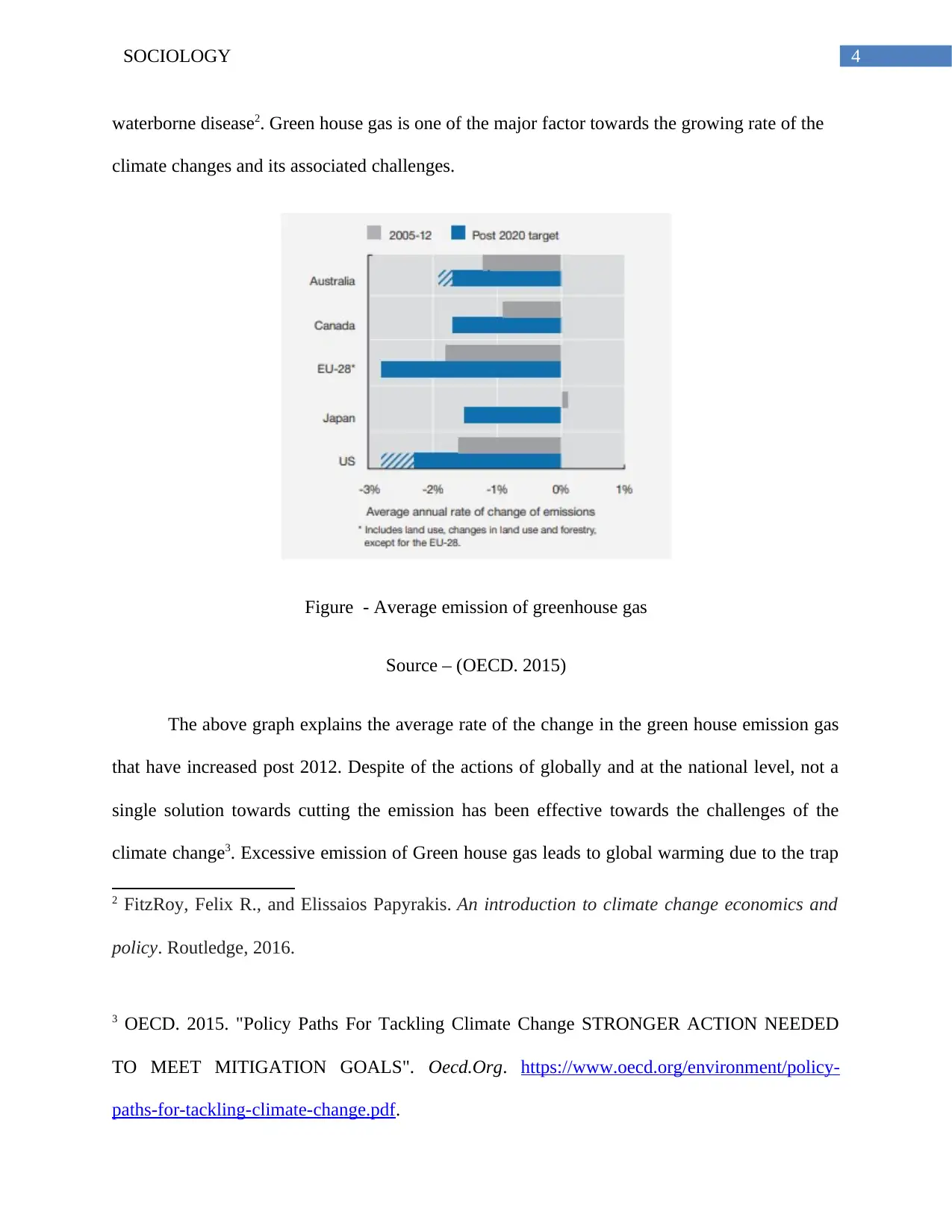
4SOCIOLOGY
waterborne disease2. Green house gas is one of the major factor towards the growing rate of the
climate changes and its associated challenges.
Figure - Average emission of greenhouse gas
Source – (OECD. 2015)
The above graph explains the average rate of the change in the green house emission gas
that have increased post 2012. Despite of the actions of globally and at the national level, not a
single solution towards cutting the emission has been effective towards the challenges of the
climate change3. Excessive emission of Green house gas leads to global warming due to the trap
2 FitzRoy, Felix R., and Elissaios Papyrakis. An introduction to climate change economics and
policy. Routledge, 2016.
3 OECD. 2015. "Policy Paths For Tackling Climate Change STRONGER ACTION NEEDED
TO MEET MITIGATION GOALS". Oecd.Org. https://www.oecd.org/environment/policy-
paths-for-tackling-climate-change.pdf.
waterborne disease2. Green house gas is one of the major factor towards the growing rate of the
climate changes and its associated challenges.
Figure - Average emission of greenhouse gas
Source – (OECD. 2015)
The above graph explains the average rate of the change in the green house emission gas
that have increased post 2012. Despite of the actions of globally and at the national level, not a
single solution towards cutting the emission has been effective towards the challenges of the
climate change3. Excessive emission of Green house gas leads to global warming due to the trap
2 FitzRoy, Felix R., and Elissaios Papyrakis. An introduction to climate change economics and
policy. Routledge, 2016.
3 OECD. 2015. "Policy Paths For Tackling Climate Change STRONGER ACTION NEEDED
TO MEET MITIGATION GOALS". Oecd.Org. https://www.oecd.org/environment/policy-
paths-for-tackling-climate-change.pdf.
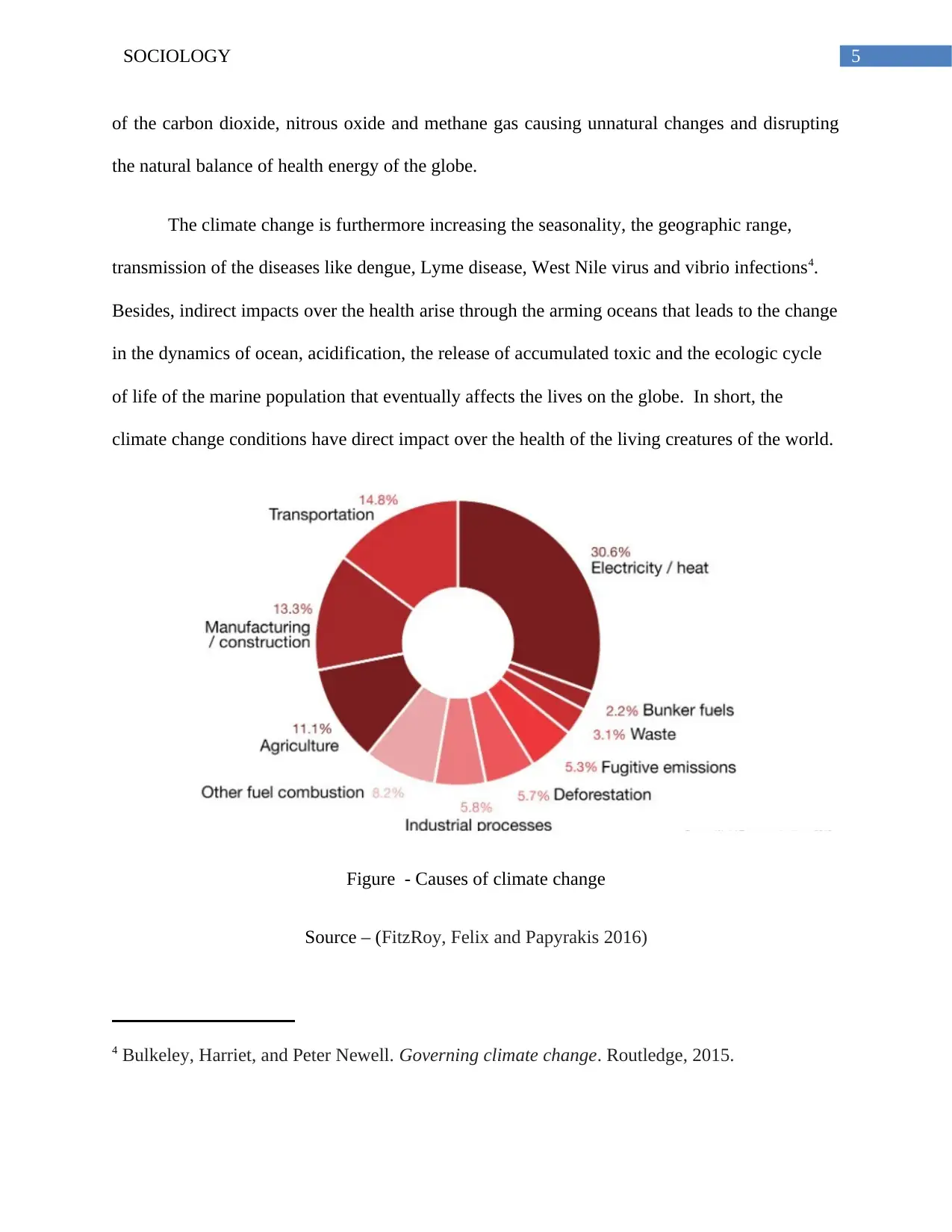
5SOCIOLOGY
of the carbon dioxide, nitrous oxide and methane gas causing unnatural changes and disrupting
the natural balance of health energy of the globe.
The climate change is furthermore increasing the seasonality, the geographic range,
transmission of the diseases like dengue, Lyme disease, West Nile virus and vibrio infections4.
Besides, indirect impacts over the health arise through the arming oceans that leads to the change
in the dynamics of ocean, acidification, the release of accumulated toxic and the ecologic cycle
of life of the marine population that eventually affects the lives on the globe. In short, the
climate change conditions have direct impact over the health of the living creatures of the world.
Figure - Causes of climate change
Source – (FitzRoy, Felix and Papyrakis 2016)
4 Bulkeley, Harriet, and Peter Newell. Governing climate change. Routledge, 2015.
of the carbon dioxide, nitrous oxide and methane gas causing unnatural changes and disrupting
the natural balance of health energy of the globe.
The climate change is furthermore increasing the seasonality, the geographic range,
transmission of the diseases like dengue, Lyme disease, West Nile virus and vibrio infections4.
Besides, indirect impacts over the health arise through the arming oceans that leads to the change
in the dynamics of ocean, acidification, the release of accumulated toxic and the ecologic cycle
of life of the marine population that eventually affects the lives on the globe. In short, the
climate change conditions have direct impact over the health of the living creatures of the world.
Figure - Causes of climate change
Source – (FitzRoy, Felix and Papyrakis 2016)
4 Bulkeley, Harriet, and Peter Newell. Governing climate change. Routledge, 2015.
⊘ This is a preview!⊘
Do you want full access?
Subscribe today to unlock all pages.

Trusted by 1+ million students worldwide
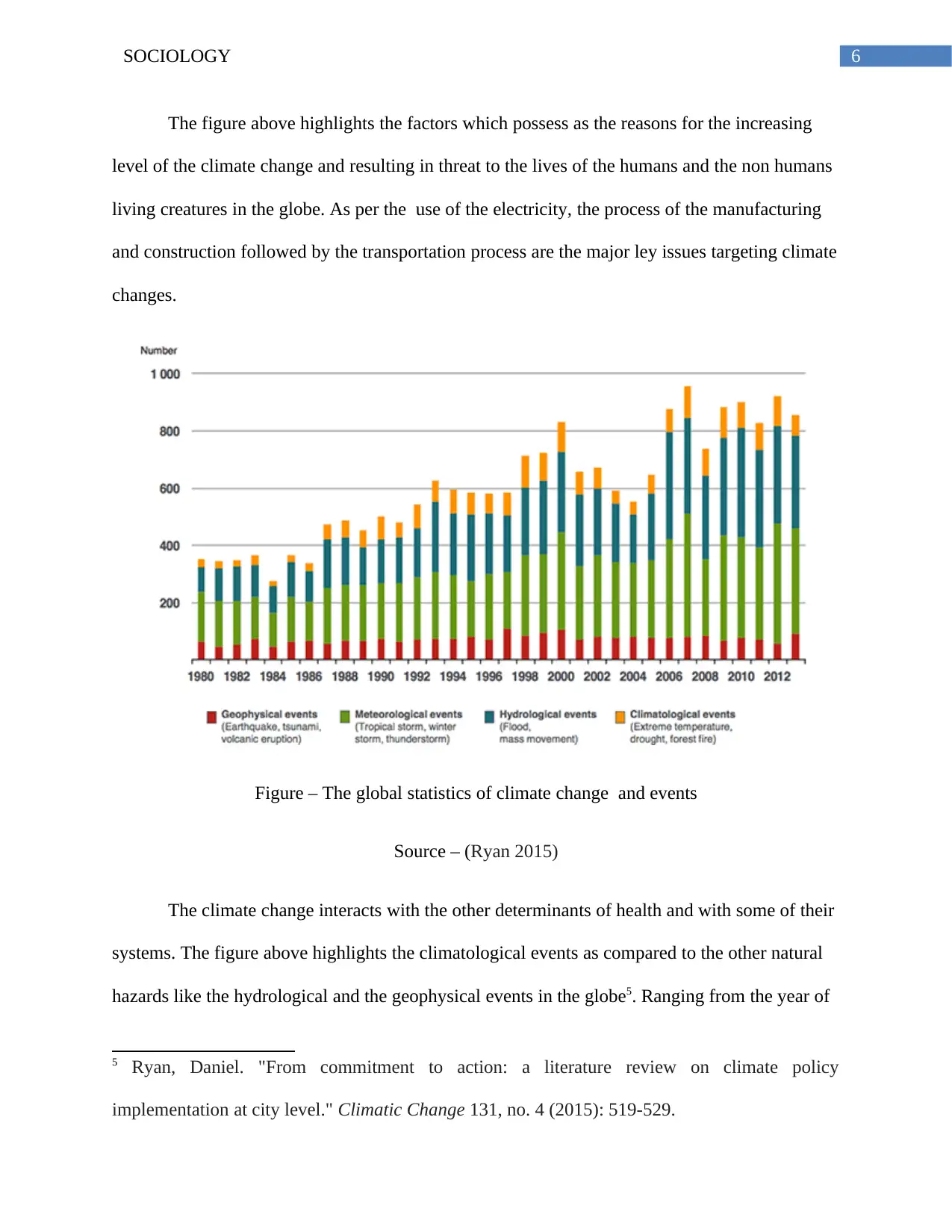
6SOCIOLOGY
The figure above highlights the factors which possess as the reasons for the increasing
level of the climate change and resulting in threat to the lives of the humans and the non humans
living creatures in the globe. As per the use of the electricity, the process of the manufacturing
and construction followed by the transportation process are the major ley issues targeting climate
changes.
Figure – The global statistics of climate change and events
Source – (Ryan 2015)
The climate change interacts with the other determinants of health and with some of their
systems. The figure above highlights the climatological events as compared to the other natural
hazards like the hydrological and the geophysical events in the globe5. Ranging from the year of
5 Ryan, Daniel. "From commitment to action: a literature review on climate policy
implementation at city level." Climatic Change 131, no. 4 (2015): 519-529.
The figure above highlights the factors which possess as the reasons for the increasing
level of the climate change and resulting in threat to the lives of the humans and the non humans
living creatures in the globe. As per the use of the electricity, the process of the manufacturing
and construction followed by the transportation process are the major ley issues targeting climate
changes.
Figure – The global statistics of climate change and events
Source – (Ryan 2015)
The climate change interacts with the other determinants of health and with some of their
systems. The figure above highlights the climatological events as compared to the other natural
hazards like the hydrological and the geophysical events in the globe5. Ranging from the year of
5 Ryan, Daniel. "From commitment to action: a literature review on climate policy
implementation at city level." Climatic Change 131, no. 4 (2015): 519-529.
Paraphrase This Document
Need a fresh take? Get an instant paraphrase of this document with our AI Paraphraser
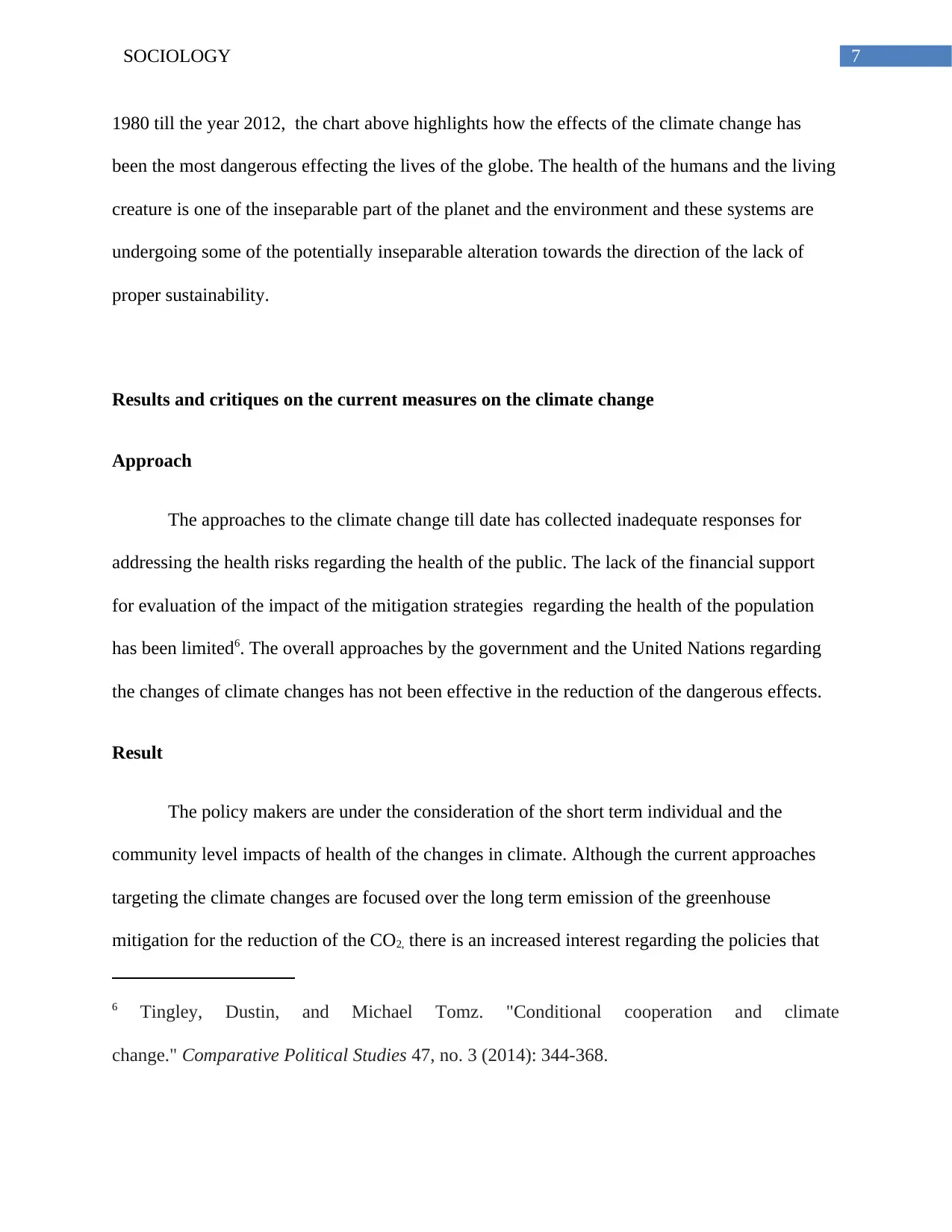
7SOCIOLOGY
1980 till the year 2012, the chart above highlights how the effects of the climate change has
been the most dangerous effecting the lives of the globe. The health of the humans and the living
creature is one of the inseparable part of the planet and the environment and these systems are
undergoing some of the potentially inseparable alteration towards the direction of the lack of
proper sustainability.
Results and critiques on the current measures on the climate change
Approach
The approaches to the climate change till date has collected inadequate responses for
addressing the health risks regarding the health of the public. The lack of the financial support
for evaluation of the impact of the mitigation strategies regarding the health of the population
has been limited6. The overall approaches by the government and the United Nations regarding
the changes of climate changes has not been effective in the reduction of the dangerous effects.
Result
The policy makers are under the consideration of the short term individual and the
community level impacts of health of the changes in climate. Although the current approaches
targeting the climate changes are focused over the long term emission of the greenhouse
mitigation for the reduction of the CO2, there is an increased interest regarding the policies that
6 Tingley, Dustin, and Michael Tomz. "Conditional cooperation and climate
change." Comparative Political Studies 47, no. 3 (2014): 344-368.
1980 till the year 2012, the chart above highlights how the effects of the climate change has
been the most dangerous effecting the lives of the globe. The health of the humans and the living
creature is one of the inseparable part of the planet and the environment and these systems are
undergoing some of the potentially inseparable alteration towards the direction of the lack of
proper sustainability.
Results and critiques on the current measures on the climate change
Approach
The approaches to the climate change till date has collected inadequate responses for
addressing the health risks regarding the health of the public. The lack of the financial support
for evaluation of the impact of the mitigation strategies regarding the health of the population
has been limited6. The overall approaches by the government and the United Nations regarding
the changes of climate changes has not been effective in the reduction of the dangerous effects.
Result
The policy makers are under the consideration of the short term individual and the
community level impacts of health of the changes in climate. Although the current approaches
targeting the climate changes are focused over the long term emission of the greenhouse
mitigation for the reduction of the CO2, there is an increased interest regarding the policies that
6 Tingley, Dustin, and Michael Tomz. "Conditional cooperation and climate
change." Comparative Political Studies 47, no. 3 (2014): 344-368.
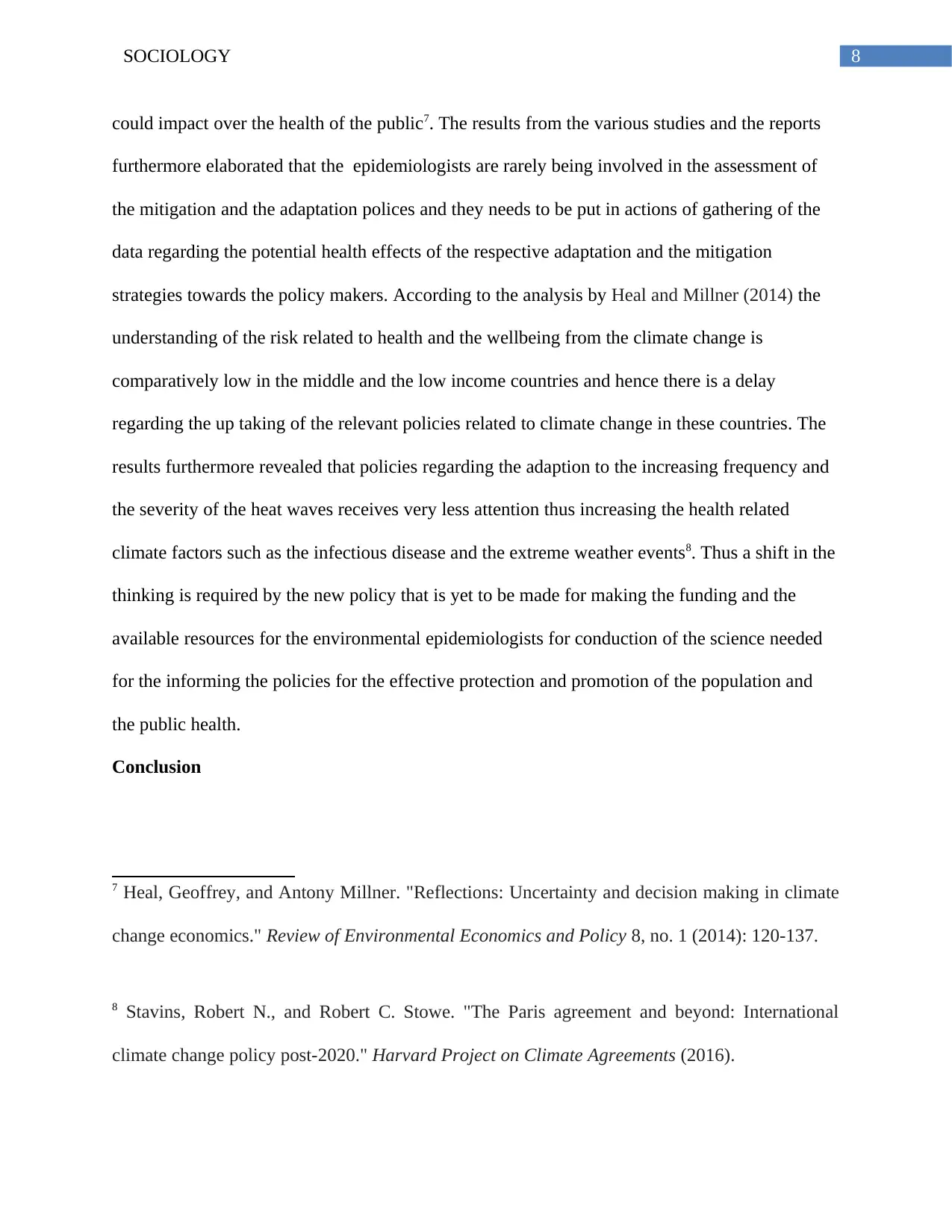
8SOCIOLOGY
could impact over the health of the public7. The results from the various studies and the reports
furthermore elaborated that the epidemiologists are rarely being involved in the assessment of
the mitigation and the adaptation polices and they needs to be put in actions of gathering of the
data regarding the potential health effects of the respective adaptation and the mitigation
strategies towards the policy makers. According to the analysis by Heal and Millner (2014) the
understanding of the risk related to health and the wellbeing from the climate change is
comparatively low in the middle and the low income countries and hence there is a delay
regarding the up taking of the relevant policies related to climate change in these countries. The
results furthermore revealed that policies regarding the adaption to the increasing frequency and
the severity of the heat waves receives very less attention thus increasing the health related
climate factors such as the infectious disease and the extreme weather events8. Thus a shift in the
thinking is required by the new policy that is yet to be made for making the funding and the
available resources for the environmental epidemiologists for conduction of the science needed
for the informing the policies for the effective protection and promotion of the population and
the public health.
Conclusion
7 Heal, Geoffrey, and Antony Millner. "Reflections: Uncertainty and decision making in climate
change economics." Review of Environmental Economics and Policy 8, no. 1 (2014): 120-137.
8 Stavins, Robert N., and Robert C. Stowe. "The Paris agreement and beyond: International
climate change policy post-2020." Harvard Project on Climate Agreements (2016).
could impact over the health of the public7. The results from the various studies and the reports
furthermore elaborated that the epidemiologists are rarely being involved in the assessment of
the mitigation and the adaptation polices and they needs to be put in actions of gathering of the
data regarding the potential health effects of the respective adaptation and the mitigation
strategies towards the policy makers. According to the analysis by Heal and Millner (2014) the
understanding of the risk related to health and the wellbeing from the climate change is
comparatively low in the middle and the low income countries and hence there is a delay
regarding the up taking of the relevant policies related to climate change in these countries. The
results furthermore revealed that policies regarding the adaption to the increasing frequency and
the severity of the heat waves receives very less attention thus increasing the health related
climate factors such as the infectious disease and the extreme weather events8. Thus a shift in the
thinking is required by the new policy that is yet to be made for making the funding and the
available resources for the environmental epidemiologists for conduction of the science needed
for the informing the policies for the effective protection and promotion of the population and
the public health.
Conclusion
7 Heal, Geoffrey, and Antony Millner. "Reflections: Uncertainty and decision making in climate
change economics." Review of Environmental Economics and Policy 8, no. 1 (2014): 120-137.
8 Stavins, Robert N., and Robert C. Stowe. "The Paris agreement and beyond: International
climate change policy post-2020." Harvard Project on Climate Agreements (2016).
⊘ This is a preview!⊘
Do you want full access?
Subscribe today to unlock all pages.

Trusted by 1+ million students worldwide
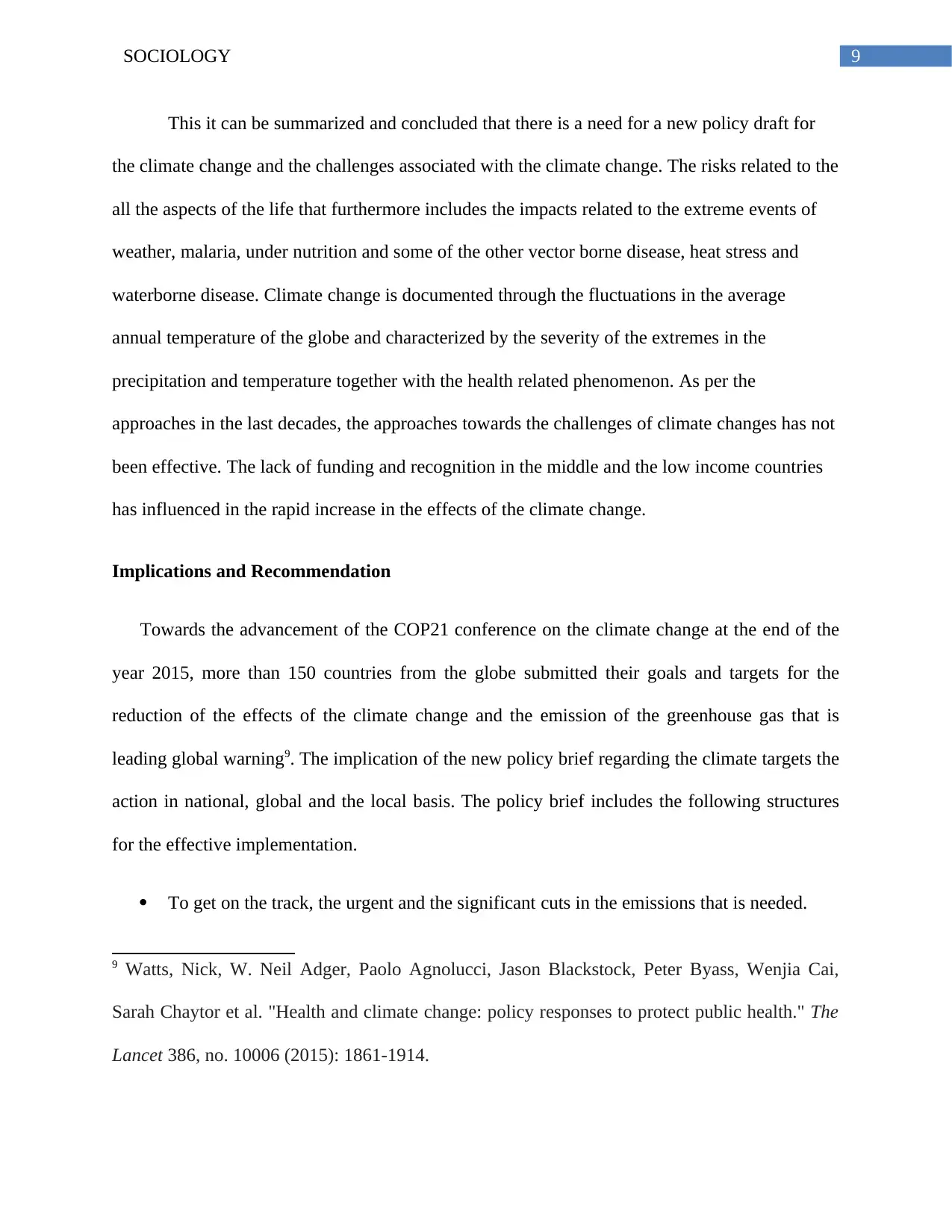
9SOCIOLOGY
This it can be summarized and concluded that there is a need for a new policy draft for
the climate change and the challenges associated with the climate change. The risks related to the
all the aspects of the life that furthermore includes the impacts related to the extreme events of
weather, malaria, under nutrition and some of the other vector borne disease, heat stress and
waterborne disease. Climate change is documented through the fluctuations in the average
annual temperature of the globe and characterized by the severity of the extremes in the
precipitation and temperature together with the health related phenomenon. As per the
approaches in the last decades, the approaches towards the challenges of climate changes has not
been effective. The lack of funding and recognition in the middle and the low income countries
has influenced in the rapid increase in the effects of the climate change.
Implications and Recommendation
Towards the advancement of the COP21 conference on the climate change at the end of the
year 2015, more than 150 countries from the globe submitted their goals and targets for the
reduction of the effects of the climate change and the emission of the greenhouse gas that is
leading global warning9. The implication of the new policy brief regarding the climate targets the
action in national, global and the local basis. The policy brief includes the following structures
for the effective implementation.
To get on the track, the urgent and the significant cuts in the emissions that is needed.
9 Watts, Nick, W. Neil Adger, Paolo Agnolucci, Jason Blackstock, Peter Byass, Wenjia Cai,
Sarah Chaytor et al. "Health and climate change: policy responses to protect public health." The
Lancet 386, no. 10006 (2015): 1861-1914.
This it can be summarized and concluded that there is a need for a new policy draft for
the climate change and the challenges associated with the climate change. The risks related to the
all the aspects of the life that furthermore includes the impacts related to the extreme events of
weather, malaria, under nutrition and some of the other vector borne disease, heat stress and
waterborne disease. Climate change is documented through the fluctuations in the average
annual temperature of the globe and characterized by the severity of the extremes in the
precipitation and temperature together with the health related phenomenon. As per the
approaches in the last decades, the approaches towards the challenges of climate changes has not
been effective. The lack of funding and recognition in the middle and the low income countries
has influenced in the rapid increase in the effects of the climate change.
Implications and Recommendation
Towards the advancement of the COP21 conference on the climate change at the end of the
year 2015, more than 150 countries from the globe submitted their goals and targets for the
reduction of the effects of the climate change and the emission of the greenhouse gas that is
leading global warning9. The implication of the new policy brief regarding the climate targets the
action in national, global and the local basis. The policy brief includes the following structures
for the effective implementation.
To get on the track, the urgent and the significant cuts in the emissions that is needed.
9 Watts, Nick, W. Neil Adger, Paolo Agnolucci, Jason Blackstock, Peter Byass, Wenjia Cai,
Sarah Chaytor et al. "Health and climate change: policy responses to protect public health." The
Lancet 386, no. 10006 (2015): 1861-1914.
Paraphrase This Document
Need a fresh take? Get an instant paraphrase of this document with our AI Paraphraser
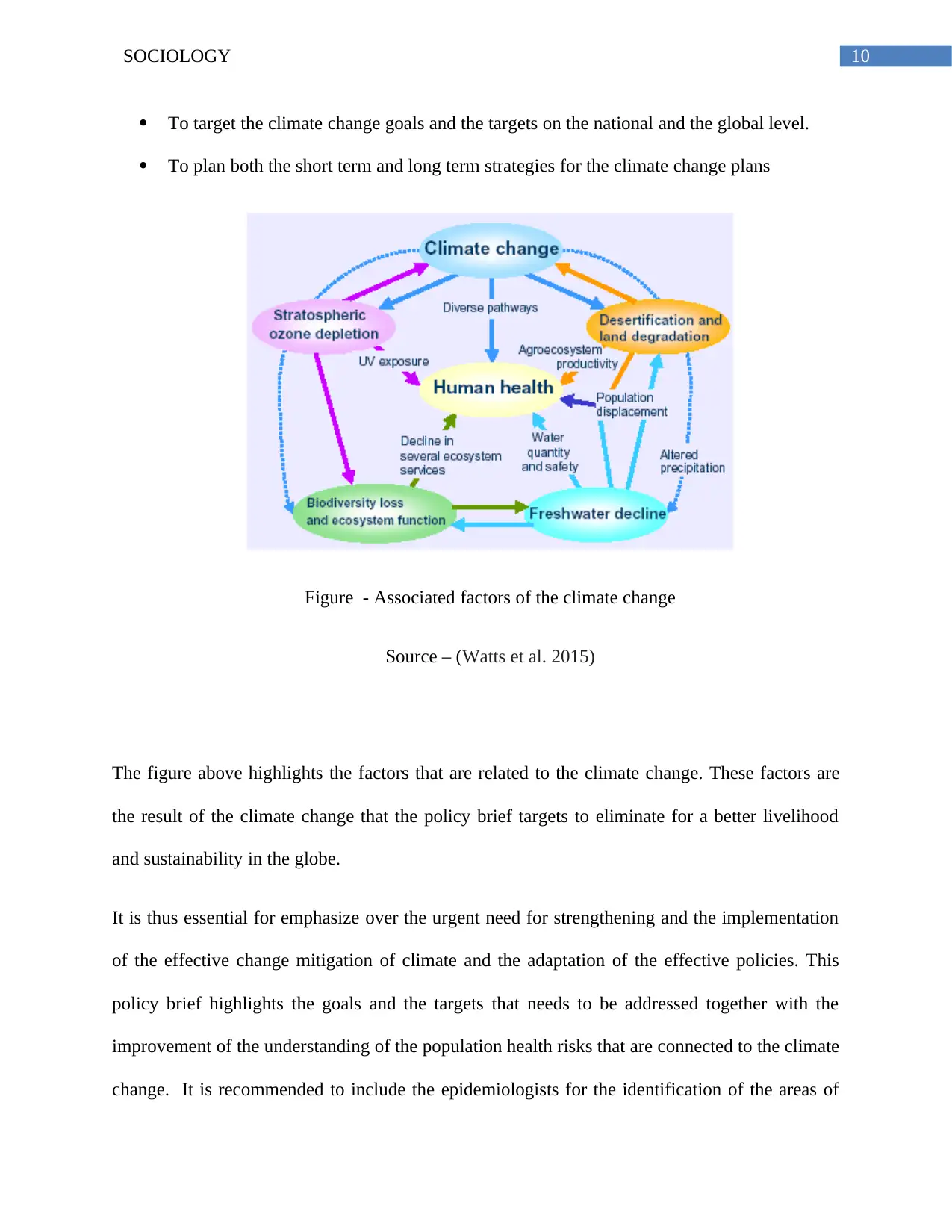
10SOCIOLOGY
To target the climate change goals and the targets on the national and the global level.
To plan both the short term and long term strategies for the climate change plans
Figure - Associated factors of the climate change
Source – (Watts et al. 2015)
The figure above highlights the factors that are related to the climate change. These factors are
the result of the climate change that the policy brief targets to eliminate for a better livelihood
and sustainability in the globe.
It is thus essential for emphasize over the urgent need for strengthening and the implementation
of the effective change mitigation of climate and the adaptation of the effective policies. This
policy brief highlights the goals and the targets that needs to be addressed together with the
improvement of the understanding of the population health risks that are connected to the climate
change. It is recommended to include the epidemiologists for the identification of the areas of
To target the climate change goals and the targets on the national and the global level.
To plan both the short term and long term strategies for the climate change plans
Figure - Associated factors of the climate change
Source – (Watts et al. 2015)
The figure above highlights the factors that are related to the climate change. These factors are
the result of the climate change that the policy brief targets to eliminate for a better livelihood
and sustainability in the globe.
It is thus essential for emphasize over the urgent need for strengthening and the implementation
of the effective change mitigation of climate and the adaptation of the effective policies. This
policy brief highlights the goals and the targets that needs to be addressed together with the
improvement of the understanding of the population health risks that are connected to the climate
change. It is recommended to include the epidemiologists for the identification of the areas of
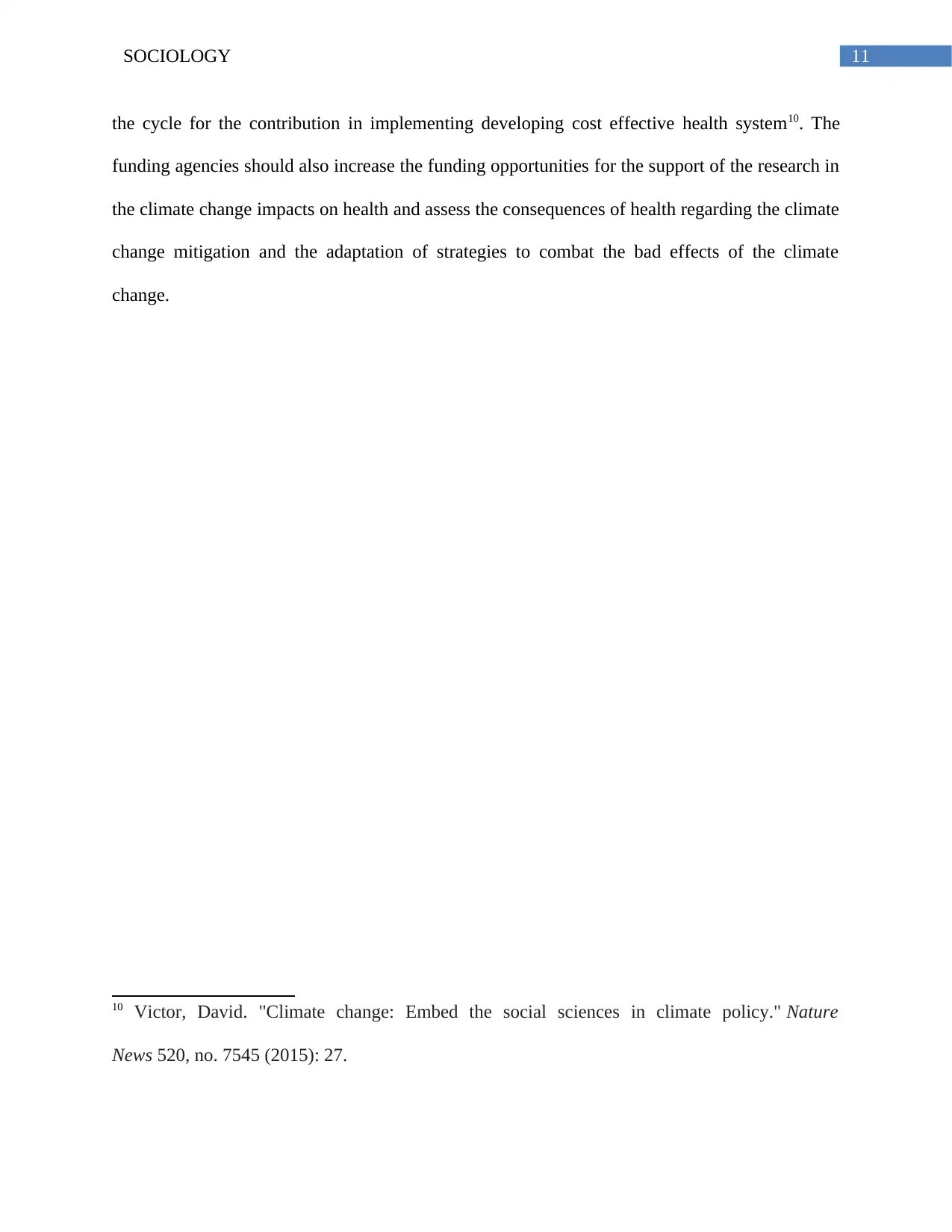
11SOCIOLOGY
the cycle for the contribution in implementing developing cost effective health system10. The
funding agencies should also increase the funding opportunities for the support of the research in
the climate change impacts on health and assess the consequences of health regarding the climate
change mitigation and the adaptation of strategies to combat the bad effects of the climate
change.
10 Victor, David. "Climate change: Embed the social sciences in climate policy." Nature
News 520, no. 7545 (2015): 27.
the cycle for the contribution in implementing developing cost effective health system10. The
funding agencies should also increase the funding opportunities for the support of the research in
the climate change impacts on health and assess the consequences of health regarding the climate
change mitigation and the adaptation of strategies to combat the bad effects of the climate
change.
10 Victor, David. "Climate change: Embed the social sciences in climate policy." Nature
News 520, no. 7545 (2015): 27.
⊘ This is a preview!⊘
Do you want full access?
Subscribe today to unlock all pages.

Trusted by 1+ million students worldwide
1 out of 14
Related Documents
Your All-in-One AI-Powered Toolkit for Academic Success.
+13062052269
info@desklib.com
Available 24*7 on WhatsApp / Email
![[object Object]](/_next/static/media/star-bottom.7253800d.svg)
Unlock your academic potential
Copyright © 2020–2025 A2Z Services. All Rights Reserved. Developed and managed by ZUCOL.





